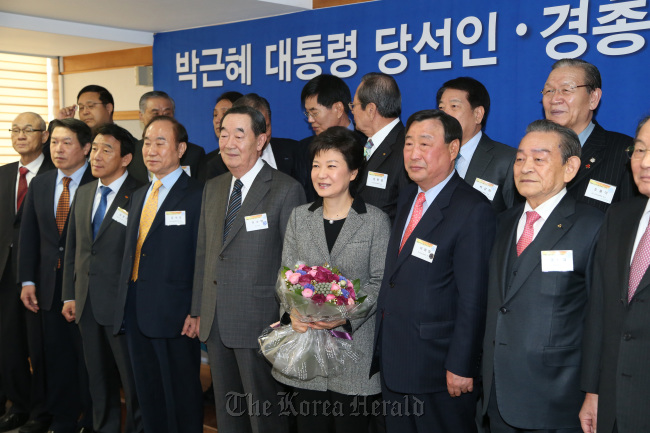박근혜 대통령 당선인은 20일 한국무역협회와 한국경영자총협회를 방문해 ”환율 안정이 굉장히 중요한 상황을 잘 알고 있다. “우리 기업이 손해보지 않도록 선제적으로, 효과적으로 대응해 나가도록 하겠다”고 말했다.
박 당선인의 직접적 환율 발언은 대선 이후 처음으로 일본의 엔저 정책에 대해 적극 대처하겠다는 의지를 피력한 것으로 보인다.
그러나 박선규 당선자 대변인은 “환율안정과 관련해 선제적, 효율적 대응한다는 말씀은 기업인들의 관심을 가져달라는 주문에 대한 답으로 정부가 환율에 적극 개입하겠다는 의미가 아니라 그야말로 환율의 안정을 위해 큰 관심을 갖고 노력하겠다는 원칙적인 입장을 밝히신 것이다. 확대해석이나 오해 없으시기 바란다”고 말했다.
김중수 한국은행 총재는 이날 경제동향간담회에서 “(외환 시장이) 투기 목적에 의해 변동성이 커지는 경우가 있다”며 “시장의 변동성을 이용해 투기하는 것은 어떤 형태로든 막아야 한다”고 말했다.
박 당선인은 또한 인력난, 기술난, 자금난 등 중소기업이 난관을 극복할 수 있도록 최선을 다해 지원하겠다며 무역협회와 정부가 함께 지원방안을 논의하도록 고민하겠다고 말했다.
박 당선인은 “앞으로 경총과 한국노총, 경영자 대표와 노동자 대표와 긴밀하게 파트너십을 유지하면서 이 두 단체와 노동문제를 협의하겠다”며 ‘한국형 노사협력 모델’의 필요성을 호소했다.
또한 “노와 사가 스스로 문제를 자율적으로 풀 수 있도록 최대한 자율 원칙을 존중하겠다”며 “경우에 따라 양쪽 모두 양보하거나 희생할 필요도 있다”고 말했다.
이어 “극단적인 불법투쟁, 잘못된 관행은 반드시 개선해 가도록 하겠다”며 “그래서 법과 질서가 존중되는 노사관계가 형성되도록, 그런 문화가 되도록 해가겠다.
박 당선인은 ”무역 2조달러 시대를 열어가는데 최선을 다하겠다“며 ”그 가운데 경제민주화 목표 아래서 함께 사는 과정에 서로를 배려하고 양보하는 노력이 중요하다“고 강조했다.
또 ”정부가 아무리 좋은 정책을 만들어도 현장에서 수용할 준비가 돼 있지 않거나 현장 요구와 떨어져 있다면 효과를 내기 어렵다“며 ”현장과 괴리되지 않는, 겉돌지 않는 정책을 만들도록 최선을 다하겠다“고 말했다.
(코리아헤럴드 최희석 기자)
<관련 영문 기사>
Park hints at vigorous currency intervention
By Choi He-suk
President-elect Park Geun-hye on Wednesday pledged to intervene in the currency market aggressively in response to a weaker yen that hurt Korean exporters.
“(I am) aware that a stable foreign exchange rate is a very important issue. (The issue) will be dealt with preemptively and effectively to prevent our businesspeople sustaining damage,” Park said during a meeting with business leaders.
Park made her first remark on the raging global currency dispute during her meeting with the leaders of the Korea International Trade Association who called for stable exchange rates.
Later in the day, she held a meeting with the Korea Employers Association.
The president-elect said that local firms’ difficulties caused by the sluggish global economy will be amplified this year by the rapid growth of companies in China and other emerging nations, and by the weak yen.
The president-elect’s spokesman Park Sun-kyoo later played down the significance of the comments saying that Park did not mean that her government will intervene.
“(Park’s) remarks about responding preemptively and effectively do not mean that the government will intervene actively,” Park Sun-kyoo told reporters.
“It is an expression of the fundamental position of (the president-elect) to pay the issue close attention and to work to stabilize the rates.”
The yen began weakening towards the end of last year, and aided by the Shinzo Abe government’s monetary policies, the yen has fallen by about 20 percent against the dollar since November.
The president-elect’s remarks came as Korea is considering a tax on bond or currency transactions to curb the market instability caused by an infusion of hot money.
“The foreign exchange rate should be determined in the market. But currency volatility tends to increase on speculative forces,” Bank of Korea Governor Kim Choong-soo said in a monthly meeting with local economic experts.
“Making speculative bets, riding on currency volatility, should be stemmed.”
The yen’s weakness coupled with the won’s recent rise is casting a shadow on the export-driven Korean economy and some of its largest conglomerates.
The Korea Automotive Research Institute estimates that a drop of 10 percent in the yen-won exchange rates would result in the automotive industry’s exports falling 12 percent.
Despite the apparent difficulties facing the Korean economy, Park set an ambitious goal for the country saying that her government would lay the foundation for increasing Korea’s trade volume to $2 trillion.
Korea’s annual trade volume surpassed the $1 trillion mark in 2011.
During the meetings, Park repeated that her government will seek growth through its “creative economy” model.
“In order to open the era of 2 trillion won (annual) international trade, all effort will be focused on rolling out effective support (measures),” she said, adding that Korea’s economic development paradigm has to be changed from following advanced nations to that of a “leading economy.”
“The creative-economy model was chosen for the new government as it was judged that (achieving growth) using the same method as before would be difficult,” she said.
“The plan is to find new growth engines, to find new markets and generate jobs through the creative economy that is based on science, technology and creativity.”
(
cheesuk@heraldcorp.com)





![[Exclusive] Hyundai Mobis eyes closer ties with BYD](http://res.heraldm.com/phpwas/restmb_idxmake.php?idx=644&simg=/content/image/2024/11/25/20241125050044_0.jpg)
![[Herald Review] 'Gangnam B-Side' combines social realism with masterful suspense, performance](http://res.heraldm.com/phpwas/restmb_idxmake.php?idx=644&simg=/content/image/2024/11/25/20241125050072_0.jpg)

